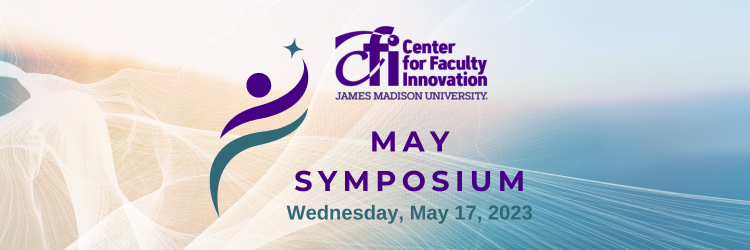Sessions will be held in Festival Conference & Student Center and on Zoom
May Symposium 2024 compiles a variety of roundtables, speakers and workshops on various topics such as course design, scholarship networks, inclusion, equity and mentoring. This exciting collaborative effort provides full-time faculty, part-time faculty and academic unit leaders with opportunities to focus on teaching, scholarship, career planning, service and leadership.
The symposium will begin with breakfast at 8:15am followed by a welcome in the Festival Highlands Room. The morning programming includes three sessions of workshops and a faculty rapid roundtable, followed by our conference luncheon and keynote speaker, Sarah Rose Cavanaugh. The afternoon programming includes additional sessions with a final virtual plenary with Sara on Mind Over Monsters: Support Youth Mental Health with Compassiionate Challenge.
REGISTRATION INFORMATION
Please refer to the May Symposium 2024 website for the full day of programming offered.
Registration is required for all of our sessions and workshops (both in-person and online) unless otherwise noted.
If this is your first time visiting the CFI Program registration page this semester, be sure to clear your browser cache/cookies and update your account profile information (including updating your college/division, department and dietary needs) during the registration process!
You will be asked to sign into the secure site using your JMU eID and password (through DUO).
Registration is recommended by: Monday, May 13 @ 1pm to ensure your participation in our full day of programming. Workshops and the rapid-roundtables are offered in-person and the afternoon plenary is a virtual presentation. Space is limited.
Breakfast & Welcome: 8:15 - 8:50 AM
Welcome and Opening Remarks by Gilpatrick Hornsby, AVP - Faculty Success & Executive Director of the Center for Faculty Innovation
Breakfast: 8:15 - 8:40 AM
Welcome: 8:40 - 8:50 AM
Location: In-person at Festival Ballroom A
Session One: 9:00 - 9:50 AM
Pathways for Providing Reasonable Accommodations in My Classroom
Description.
Facilitated by:
Small Teaching Idea Exchange
Description.
Facilitated by:
Morning Break: 9:50 - 10:00 AM
Session Two: 10:00 - 10:50 AM
Faculty Identity and Wellbeing: Do They Reinforce or Contradict Each Other?
Description TBA.
Facilitated by:
Join a (paid) collaborative research team to support student and faculty success
Description TBA.
Facilitated by:
Evaluating Cross-Cultural Experiences using the BEVI and other Methods
Description TBA.
Facilitated by:
Break: 10:50 - 11:00 AM
Faculty Rapid Roundtables: 11:00 - 11:20 AM
Rapid Roundtables
11:00 - 11:20 PM, In person at Festival Ballroom A
NO Registration Required
TBA
Break: 11:20 - 11:30 AM
Keynote Speaker and Conference Lunch: 11:30 - 2 PM
Keynote Speaker, Sarah Rose Cavanagh
Sarah Rose Cavanagh is the Senior Associate Director for Teaching and Learning in the Center for Faculty Excellence at Simmons University, where she also teaches in the Psychology Department as an Associate Professor of Practice. Before joining Simmons, she was a tenured Associate Professor of psychology and neuroscience at Assumption University, where she also served in the D'Amour Center for Teaching Excellence as Associate Director for Grants and Research. Sarah's research considers the interplay of emotions, motivation, learning, and quality of life.
Her most recent research project, funded by the National Science Foundation, convenes a network of scholars to develop teaching practices aimed at greater effectiveness and equity in undergraduate biology education.
She is author of four books, including The Spark of Learning: Energizing the College Classroom with the Science of Emotion (2016) and Mind Over Monsters: Supporting Youth Mental Health with Compassionate Challenge (2023).
Sarah gives keynote addresses and workshops at a variety of colleges and regional conferences, blogs for Psychology Today, and writes essays for venues like Literary Hub and The Chronicle of Higher Education. She’s also on BlueSky too much, at @SaRoseCav
Keynote Speaker & Conference Lunch: 11:45 AM - 1:15 PM (Virtual presentation)
During this virtual interactive session, we will explore how thinking strategically about emotion in the classroom can enliven the classroom experience for teachers and students alike.
The Spark of Learning: Energizing the College Classroom with the Science of Emotion
Written for educators, Spark of Learning argues that thinking strategically about emotion in the classroom can enliven the classroom experience for teachers and students alike.
In friendly, readable prose, Sarah Rose Cavanagh argues that if you as an educator want to capture your students’ attention, harness their working memory, bolster their long-term retention, and enhance their motivation, you should consider the emotional impact of your teaching style and course design.
Insert Sara's photo and book image
1st AFTERNOON BREAK 1:20 - 1:30 PM
Session Three: 1:30 - 2:20 PM
Insert
TBA
2nd AFTERNOON BREAK / TRAVEL 2:30-3:00 PM
Break - Boxed Treats provided
Festival Ballroom A
Travel to your location of choice for the 3 PM Virtual Plenary presentation.
Space is available throughout Festival. More details provided at check-in.
AFTERNOON PLENARY WITH SARAH ROSE CAVENAUGH
Afternoon Workshop: 3 - 4:30 PM
As a follow-up to the keynote presentation, Sarah shares an investigation into the mental health crisis affecting young adults today.
Mind Over Monsters
An investigation into the mental health crisis affecting young adults today, and an impassioned argument for creating learning environments characterized both by compassion and challenge.
Alarming statistics in recent years indicate that mental health problems like depression and anxiety have been skyrocketing among young adults. Cavanagh brings the reader on an invigorating tour of pedagogical, neuroscientific, and psychological research on mental health—one that involves her own personal journey from panic to equilibrium.

